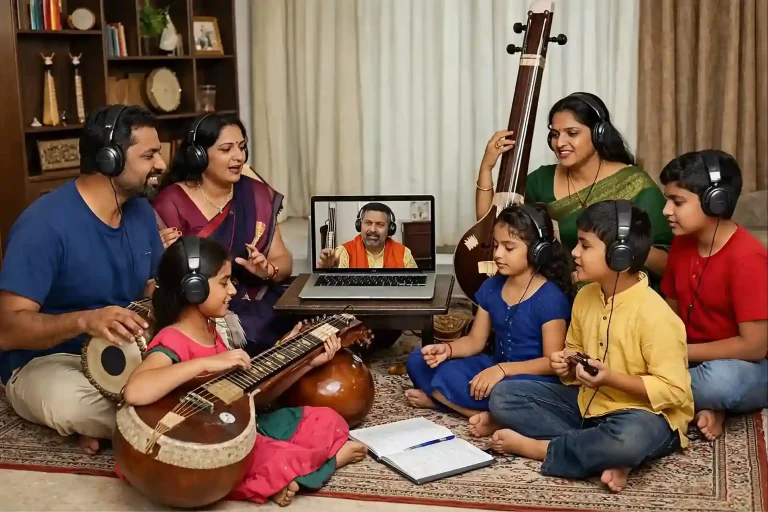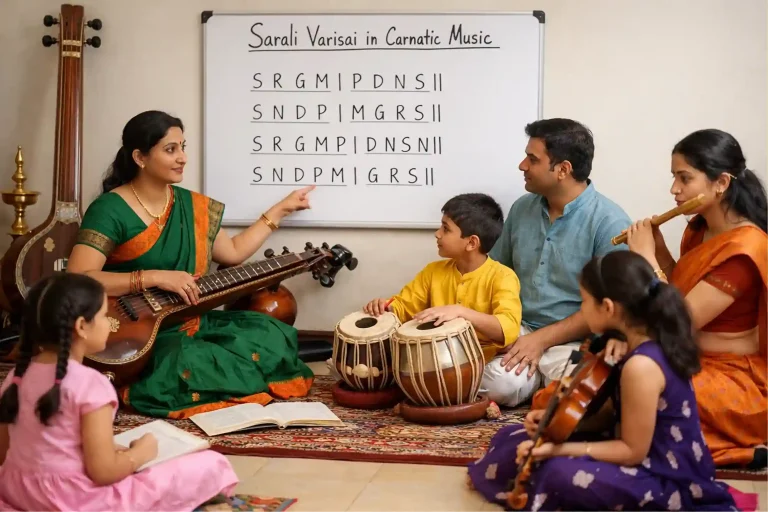All Topics
- Alchemizing Music Concepts for Students
- Artist Spotlight
- artium gift card
- Artium Maestros
- Artium News
- buying guide
- Carnatic Music
- Devotional Music
- Editorials by Ananth Vaidyanathan
- Film Music
- Guitar
- Hindustani Classical Music
- Indian Classical Music
- Indian Folk Music
- Insights
- Instruments
- Karaoke Singing
- Keyboard
- Kids Music
- maestros
- Music Education
- Music for Kids
- Music Industry
- Music Instruments
- Music Legends
- Music Theory
- Music Therapy
- Piano
- piano guide
- Success Stories
- Tamil Film Music
- Telugu Film Music
- Time Theory
- Tools
- Uncategorized
- Vocal Singing
- Vocals
- western classical music
- western music
- Western vocal music
7 Tips for Developing Your Classical Singing Technique
7 Tips for Developing Your Classical Singing Technique

Table of Contents
The world of Hindustani Classical Music is both intriguing and intricate to master. At its core, classical music is about delivering music in its purest form. This calls for a balance of power and delicacy, technical mastery and expressive depth. With the help of a few certain techniques, your learning and understanding of Hindustani classical music will skyrocket to the point where you can connect with your audience on an emotional level.
To help you along your journey, we’ve compiled some of the best tips and tricks for you to advance in the world of Hindustani classical music. Let’s go through them, shall we?
But before that…
If you’re really excited to start your journey in music, start with a free trial lesson today!
Focusing on Breath Control
Controlled breathing is the cornerstone of classical singing, and mastering it is essential for achieving both power and endurance. Your best move here is to work on breathing through your diaphragm. Diaphragmatic breathing is a method that engages the diaphragm to help reduce tension in the neck and shoulders, preserving vocal health over time. Unlike shallow chest breathing–which can leave the voice strained, diaphragmatic breathing provides the deep, sustained airflow necessary to support long phrases and maintain a resonant tone.
Diaphragmatic breathing is just the foundation, however. To ensure you perform your best, here are a few more exercises you can do:
- Counted Breathing: Inhale for a count of four, hold for four, and exhale for a count of eight. Slowly increase the counts as you start to grow accustomed to the exercise. This exercise improves stamina, preparing you for more demanding musical passages.
- Deep Inhalation: Lie flat on your back, place a hand on your abdomen, and take a slow, deep breath. Focus on expanding your stomach, not your chest. Hold your breath briefly, then exhale slowly, feeling the hand fall as you empty your lungs. Your focus here should be on expanding your stomach instead of your chest.
A Consistent Vocal Warm-Up
Regular warm-ups are necessary for singers to ensure their body and vocal cords are healthy. Just like an athlete warms up their muscles before a workout, singers are required to warm up their vocal cords to increase flexibility, build resilience, and expand vocal range. These warm-ups are also healthy for the voice in the long run. You slowly ease into your singing range and your voice adjusts to different pitches, dynamics, and tonal qualities in a controlled way.
So, as you start to learn Hindustani music, here are a few warm-ups you can perform:
- Humming: Begin with gentle humming on a comfortable pitch, focusing on relaxation. Start with a light “mmm” sound, moving up and down your range slowly. Humming helps to warm up the voice with minimal strain and it helps encourage resonant sound production.
- Lip Trills: Create a gentle “brr” sound by lightly blowing air through your lips. Lip trills help in engaging breath support, releasing tension and also in promoting airflow. They are great for preparing your voice without pushing it too far.
- Sirens: Glide smoothly from low to high notes (like a siren) on an “oo” or “ah” sound. This helps warm up the full range and encourages smooth pitch transitions.
Pitch Accuracy
Pitch accuracy is an extremely important aspect while taking Hindustani classical vocal classes. Practising this allows for the creation of an emotionally impactful performance. Hitting the correct pitch consistently not only builds credibility as a musician but also allows the listener to experience the harmony and nuance of the music fully. With the help of pitch training, you can communicate the intended emotions of a piece with clarity and authenticity, drawing your audience into the experience.
To help you improve your pitch accuracy in Hindustani classical music, here are a few exercises that you can adopt:
- Ear Training: One way that you can improve yourself is by training your ears to hear a song’s pitch variations. There are many platforms such as what we offer at Artium Academy that provide online music classes to help you improvise your pitching skills. This training enhances your pitch accuracy and helps you stay on track during challenging musical passages.
- Pitch Matching: Sing a single pitch played on a piano, then repeat it a few times, listening carefully to any deviations from the pitch. This will help improve your pitch consistency and build a reliable internal pitch reference.
- Interval Training: Practise singing specific intervals (e.g., minor third, perfect fifth) with a keyboard. Start by listening to the interval, then try matching the pitches on your own. This strengthens your sense of relative pitch, which is essential for navigating complex melodies.
Articulation and Engaging Performances
Being able to properly articulate the words of the lyrics helps you connect with the audience at a deeper level. They can relate and understand the message that your music is trying to convey. This allows for a much more engaging performance where every word carries weight and emotion that hits the audience.
Effective diction adds weight and impact, allowing the words to resonate with the audience. Clear articulation helps you achieve that, especially with a relaxed and controlled tone. Over-enunciating is bad for your voice as it creates a strain on it, so understanding and finding a proper balance is needed. For Hindustani classical music, this is of utmost importance.
As you go through classical singing lessons, here are a few tricks to help you along your way:
- Tongue Twisters: Practise tongue twisters slowly, paying attention to each consonant and vowel sound. Start slow, then gradually increase speed as you become more comfortable.
- Over-Articulation Practice: Take a short phrase from a song and sing it slowly, exaggerating each consonant and vowel. This will allow you to develop muscle memory for clear enunciation. Eventually, return to normal delivery and compare the differences, seeing how much clearer and more impactful the words sound.
- Lip and Tongue Stretches: Gently stretch and loosen your lips and tongue to make your articulators more flexible. Try buzzing your lips, rolling your tongue, or making exaggerated mouth movements (like saying “ee,” “oh,” and “ah”) to relax the muscles.
Broadening Your Vocal Range
To learn Hindustani music, you must first broaden your vocal range. Expanding your vocal range is an exciting journey that opens up endless possibilities for expressing yourself through classical singing. Having a wider range allows you to tackle a higher variety of dynamic emotional contrasts and deliver more compelling performances. By developing both the higher and lower ends of your voice, you’re building versatility, power, and control and are evolving into a better and more captivating performer.
By gradually expanding your range, you’ll build confidence, flexibility, and expressive depth in your singing. So, to elevate your range, we present SOVT or Semi-Occluded Vocal Tract exercises. These would include exercises like straw phonation or lip trills and they encourage healthy vocal fold engagement, reducing tension as you work on range. Another way is by utilising pitch jumps. Practice jumping between intervals, such as a fifth or an octave. Start with lower intervals and work up to larger ones. This exercise builds strength and flexibility, preparing your voice for challenging jumps in the classical repertoire.
Understand that expanding your range will take time, so take the time to properly understand and avoid pushing, and focus on maintaining a relaxed, steady sound.
Hydration is The Way
Staying hydrated is one of the biggest ways a singer can look after themselves. It is such a vital habit, especially for Hindustani classical music, as it requires endurance and vocal clarity. Drinking plenty of water before and during practice helps the vocal cords to vibrate freely and produce a clear, consistent sound. Without proper hydration, your vocal cords can dry out, making it harder to produce clear vocals and sustain longer periods of singing.
To make sure you get the best results, you must drink water consistently. But instead of having a large amount in one go, take small sips of water during practice. Keep your bottle next to you. Avoid any caffeinated beverages like coffee, soda and certain teas, as they can be dehydrating. Stick to normal water. Along with normal water, even warm water is beneficial. Warm (not hot) water can be helpful when you learn Hindustani music, as it can be soothing for the vocal cords. Cold water may cause your muscles to constrict slightly, so room temperature or warm water is often ideal for singers.
Take Private Lessons
It is possible to learn classical music and improve your singing technique on your own through online resources, sheet music and practice exercises, it is in your best interest to take on a private tutor. Having a tutor by your side will help fast-track your musical journey and make sure that you stay on the right path. As you learn Hindustani music, the tutor can correct any mistakes you make and provide you with the guidance that you require. They can identify subtle adjustments that improve your tone, breathing, and diction, which are hard to pick up from videos or online resources alone. A coach is also trained to spot any bad habits early on, such as incorrect posture or forced breathing, which can lead to vocal strain or even long-term damage if not corrected.
Tutors can be quite invaluable in your learning journey and we at Artium Academy can help you out there. The tutors we offer are all well-established in their specific fields and genres of music and are willing to help guide you through. Their expertise can help you build a strong foundation, reinforcing healthy habits that will serve you throughout your singing journey. They can tailor exercises and repertoire to challenge you appropriately, ensuring that you’re continually improving without overwhelming your voice. If you sign up for Hindustani classical vocal classes, our tutors can ensure that you remain on the right track but also cherish the learning experience.
Conclusion
With your classical music journey underway, you can see that it is essential to take steps and improve your singing techniques. With the help of pitch practices, vocal ranges and more, you can immensely improve your understanding of classical music. Hindustani classical music is known for being a tough genre to crack however, with these techniques, your journey is bound to get easier.
But it doesn’t have to end there. Our esteemed and certified teaching faculty at Artium Academy can help you along your musical journey. Under their guidance, you can take Hindustani classical vocal lessons and take the right steps towards improving your classical singing techniques.






